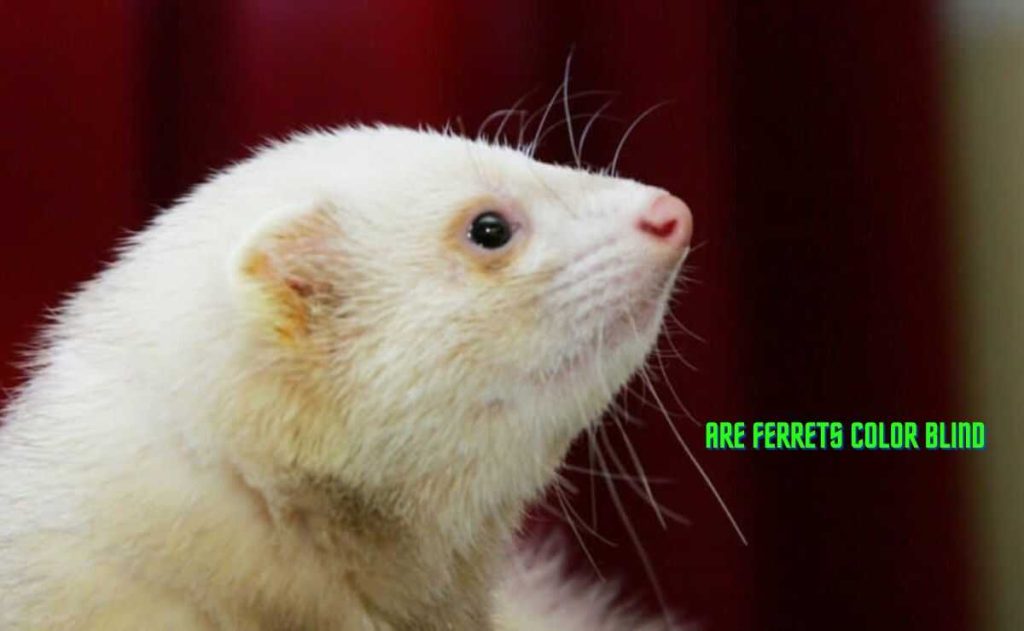Ferrets often fall off a table or maximum time they can’t land properly after a high jump. This can be a part of clumsiness in their behavior. Or you may seem like ferrets are blind. But in reality, the situation is different.
Ferrets have poor eyesight which causes a lot of issues in their movement. You’ll surprise to know that they can see only 2-3 feet away. Moreover, the placement of their eyes leads to binocular or stereoscopic vision and you can notice their weird behavior.
Are Ferrets Blind?

Ferrets are not blind by born. Since they haven’t good eyesight, they have some difficulties in their activity. However, if you observe their natural habitat which is primarily underground tunnels, they don’t need sharp eyesight. Well, that makes sense but for domestic ferrets, it becomes a serious issue.
Their eyes are strategically positioned on the sides of their heads, so they have a peripheral vision compared to humans. This is the main reason their eyesight isn’t too sharp like us. Approaching a ferret head-on may go unnoticed, as their vision becomes blurry in that direction.
Adding to their visual quirks, ferrets possess a blind spot right in front of their noses. That’s why you see them extensive sniffing. It’s not just curiosity; their sense of smell compensates for the visual gap. Sniffing helps them comprehend the world around them, as their eyesight alone might not suffice.
Are Albino Ferrets Blind?
The color of a ferret doesn’t dictate its likelihood of having vision problems. White ferrets, just like their furry counterparts of different colors, may face issues with poor eyesight during their lives.
Now, if your white-furred friend happens to be albino, it means they lack pigmentation in their skin, eyes, and fur. However, being albino doesn’t necessarily mean a higher risk of blindness. White-furred ferrets, whether albino or not, generally share a similar level of eyesight with other ferrets.
Are Red-Eyed Ferrets Blind?
Red-eyed ferrets are also known as albino ferrets. They may have a bit of a sensitivity to bright lights, but it doesn’t mean they’re automatically born blind.
Albino ferrets are a bit rare in the wild, and breeders often specialize in bringing these white-furred ferrets due to their growing popularity. Their bright white fur and, of course, those striking red eyes impress all. But, here’s the catch– albino ferrets can experience nearsightedness, much like their pigmented counterparts.
While red-eyed ferrets are not necessarily born blind, they may face some unique challenges. They might be a tad more sensitive to bright lights, but that’s just a quirk that adds to their charm. Like any other ferret, albino ferrets can go blind as they age, encounter physical trauma, or grapple with stubborn eye infections.
How good is a ferret’s vision?
Simply, ferrets do not have good vision. Their ability to see clearly is limited to objects in close proximity. Their natural habitat is in dark, underground places which have shaped their way of seeing things.
Ferrets’ eyes are set more on the sides of their heads than those of dogs or cats. This gives them a good view on the sides but leaves a blind spot right in front of their noses.
Ferrets can’t see far away very well. So, they make up for it by relying a lot on their sense of smell, hearing, and touch. Their eyes are actually best suited for seeing in low light, like during the early morning or late evening when their wild cousins, the polecats, hunt small creatures.
As ferrets grow older, their eyesight tends to get even weaker. Sometimes, a ferret might lose its sight because of things like cataracts, injuries from fights with other ferrets, or frequent eye infections.
Can Ferrets Go Blind?
Blindness is quite common, especially among older ferrets or those with a track record of eye infections. If your ferret tends to get into scuffles, there’s an increased risk of blindness, as injuries from fights can often result in losing sight.
Ferrets that engage in a bit too much roughhousing and fighting can end up facing blindness. This happens when physical trauma, especially to a ferret’s eyes, leads to a premature loss of vision.
It’s essential to note that ferrets don’t kick off their lives with superhero eyesight. They start out nearsighted and depend on their other senses to make their way around. So, when it comes to ferrets, going blind isn’t always a negative thing. They’re pretty adaptable and can manage quite well even without top-notch vision.
How can you tell if your ferret is blind?
It’s crucial to look for the signs of blindness in your ferrets. If your ferret’s eyes seem cloudy, hazy, red, swollen, or they’re producing more liquid than usual (runny), it might be time to investigate.
Eye conditions in ferrets can be painful or uncomfortable. If your fuzzy friend is scratching at their eyes, it’s a clear sign that something might be bothering them. Scratching can make their eyes sore, adding a layer of discomfort to the mix.
If your ferret’s vision loss happens suddenly, you might notice a more dramatic shift in their behavior. They might struggle to navigate their surroundings. However, if the loss occurs gradually, ferrets are champs at adapting. They’ll find their way around despite the challenges.
Can Ferrets See In The Dark?
This is the most common question of ferret breeders whether ferrets can see in the dark or not? Ferrets aren’t exactly night owls, but they do have a knack for low-light conditions. The early morning and late evening become their prime time to shine.
Most domestic ferrets lead an indoor life. This lack of exposure to changing light conditions can leave them in the dark, quite literally. So, if you have a designated ferret space, consider creating a soft-light place. It’s not just about their eyes; it’s about their overall well-being.
Are Ferrets Color Blind?

Ferrets aren’t born colorblind. They do have a sense of color, but it’s not as refined as ours. Ferrets color vision is not as sharp, and they see a broader range than our canine companions. However, ferrets struggle with distinguishing between red and green.
Ferrets may face challenges in distinguishing between certain colors. This can be a tad tricky when it comes to training them. It’s not impossible, but it requires a bit of understanding and creativity on your part.
Can Ferrets Recognize You?
Ferrets are not just pets; they are social wizards. They don’t just recognize their owners; they’ve got a talent for recognizing the entire family. Their social intelligence makes them not only good pets but also excellent companions.
Young ferrets might not prove social creatures at first time. Their boundless curiosity and suspicion can make them seem a bit standoffish. It’s not a vision problem; it’s just their nature. The key is to give them time and space to grow and mature.
As the ferret age, they become more than just curious critters; they become affectionate companions. So, if your ferret is currently more intrigued by exploring than cuddling, don’t worry. Time and patience are the secret for making a deep bond.
Conclusion
Ferrets are not blind, but it is true that their eyesight is not good. This unique eyesight placement is also responsible for their vision. But they rely on their other senses, especially their keen sense of smell, to navigate the world around them.
So poor eyesight doesn’t stop them from leading a happy life.
